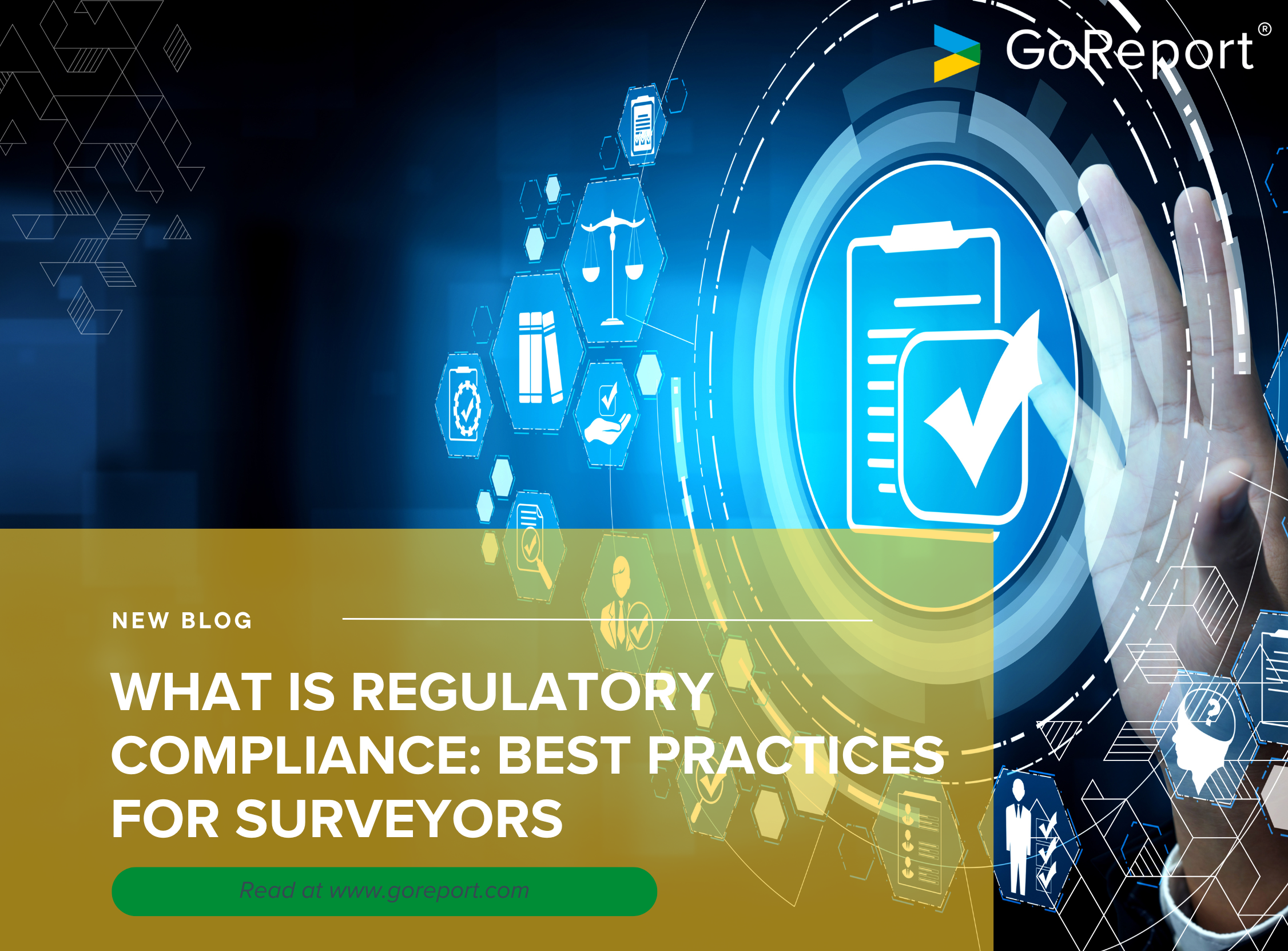What is Regulatory Compliance: Best Practices for Surveyors

Regulatory compliance. It might not be the most glamorous phrase in the property industry dictionary, but it’s one of the most important. For commercial surveyors across the UK and Ireland, it’s the quiet backbone of your work, not to mention the difference between reports that inspire confidence and those that fall apart under pressure.
Clients today expect more than just measurements and technical know-how. They expect you to be on top of the latest regulations, whether that’s building safety requirements, environmental responsibilities, or professional standards set by RICS. And let’s be honest, that expectation can feel heavy when you’re juggling deadlines, site visits, and client demands.
So what do property professionals such as surveyors really want to know about regulatory compliance?
- What is regulatory compliance in simple terms?
- Why does it matter so much in day-to-day surveying?
- What happens if you get it wrong?
- Which areas should you focus on most?
- How can you manage compliance without drowning in admin?
This guide tackles all of those questions head-on. We’ll explain what regulatory compliance means, why it’s not just about avoiding penalties, and how to make it work in your favour. You’ll find practical advice, best practices, and insights into where regulations are heading by 2026.
Most importantly, you’ll see that compliance doesn’t have to be a burden. Done right, it’s a chance to strengthen client relationships, improve efficiency, and future-proof your business.
Contents
- What is regulatory compliance?
- Why regulatory compliance matters for surveyors
- The cost of non-compliance (and how it shows up in real life)
- Key areas of regulatory compliance in surveying
- Best practices for surveyors managing compliance
- How digital tools can take the pressure off
- Looking ahead: how regulations may change by 2026
- FAQs about regulatory compliance for surveyors
What is regulatory compliance?
Regulatory compliance simply means following the rules, laws, standards, and professional requirements that apply to your work. This can range from ensuring fire safety regulations are observed to delivering technical due diligence reports that meet RICS expectations. Compliance is about giving your clients reports they can trust, while protecting yourself and your firm from legal or financial risk.
Why regulatory compliance matters for surveyors
Surveyors and many other property professionals carry serious responsibility. Your reports influence investment decisions, building projects, and risk assessments worth millions. Regulatory compliance matters because:
- It protects clients from unnecessary risk.
- It safeguards your reputation and professional standing.
- It keeps projects moving by reducing the risk of delays or rejections.
- It provides legal protection, showing that your work meets required standards.
Basically, compliance makes your reports credible. Without it, your expertise loses weight in boardrooms, tribunals, and client meetings.
The cost of non-compliance
When compliance is neglected, the fallout is rarely small, and instead can have drastic consequences. Here’s what surveyors risk:
- Legal trouble: fines, sanctions, or being struck off professional registers.
- Financial damage: project overruns, penalties, or compensation claims.
- Reputation hits: once clients lose trust, it’s hard to get it back.
- Stress and liability: surveyors themselves can face personal accountability.
Take construction risk assessments as an example. A weak or incomplete risk assessment doesn’t just risk project delays, it could actually expose you directly to liability claims. Compliance protects you from that nightmare scenario.
Key areas of regulatory compliance in surveying
For surveyors, compliance spans several overlapping areas:
- Health and safety regulations: everything from PPE rules to working at height.
- Building and fire safety: increasingly under scrutiny after Grenfell.
- Environmental standards: environmental due diligence is now routine.
- Technical due diligence: clients expect watertight reports (see our guide).
- Data compliance: GDPR and secure data handling aren’t optional extras.
- RICS professional standards: covering ethics, transparency, and competence.
Every project is different, but most surveyors will deal with a mix of these.
Best practices for surveyors managing compliance
So, how do you make regulatory compliance part of your daily work without it feeling like a second job? Here are the best practices surveyors should work into their everyday tasks:
- Standardise processes: create reporting templates and workflows so every job follows the same structure.
- Keep up with training: invest in CPD sessions and refreshers to stay on top of new legislation.
- Document everything: good records protect you when reports are challenged.
- Check before you sign: a final compliance checklist can catch errors before they leave your desk.
- Leverage digital reporting: use platforms like GoReport to embed compliance checks into your workflow.
When these best practices become routine, compliance stops being something you “add on” and becomes the natural flow of your work. It saves time, reduces risk, and makes your reports stand out for all the right reasons.
A plan, of course, only works if the whole team sticks to it. That means setting clear expectations, making compliance part of onboarding, and reinforcing standards regularly. People are more likely to follow procedures if they understand why they matter and if the process itself is straightforward. Surveyors are busy enough without extra admin, so the trick is to create a plan that’s simple, consistent, and backed by tools that make it easy to follow.
How digital tools can take the pressure off
Manual compliance checks are time-consuming, and when you’re under pressure to deliver, mistakes can slip through. That’s why surveyors are increasingly turning to digital platforms.
Tools like GoReport don’t just tidy up your reports. They:
- Walk you through compliant processes step by step
- Eliminate duplication and human error
- Create audit-ready records
- Adapt quickly when regulations change
Instead of treating compliance as an afterthought, it becomes a natural part of your reporting process. You can see it in action with a free demo.
Looking ahead: how regulations may change by 2026
Surveyors don’t have the luxury of ignoring future trends. By 2026, expect to see:
- Tighter environmental rules linked to net zero targets
- More mandatory digital record-keeping from both clients and regulators
- Ongoing fire safety reforms shaping building and property inspections
- Economic pressures that make efficiency and compliance inseparable
The firms who treat compliance as a cornerstone now will be far more resilient when those changes hit.
FAQs about regulatory compliance for surveyors
What is regulatory compliance in surveying?
It’s following the legal and professional rules that apply to your work, covering safety, data, and reporting standards.
Why does regulatory compliance matter?
It keeps projects moving, protects your reputation, and provides a safeguard against liability.
What are the main risks of non-compliance?
Fines, legal action, project delays, and damage to professional standing.
How can surveyors simplify compliance?
By standardising reports, documenting clearly, training regularly, and using digital reporting tools like GoReport.
Will regulations change soon?
Yes. Expect stricter environmental, fire safety, and digital reporting requirements by 2026.
What are the three types of compliance?
Broadly speaking, compliance falls into three categories: corporate (company-wide rules and governance), regulatory (external laws and industry standards), and internal (policies and procedures set by your firm to maintain consistency).
What is an example of compliance?
An example would be a surveyor completing a fire safety inspection in line with building regulations and RICS standards, documenting it through a secure digital report, and ensuring all data is stored in line with GDPR requirements.
When regulatory compliance is built into your daily workflow, it makes your work stronger, not harder.
Digital tools are part of that shift. With GoReport, surveyors can simplify compliance, reduce errors, and deliver reports clients trust. Curious about making compliance less of a headache? Book a demo with GoReport today and see how easy it can be.








